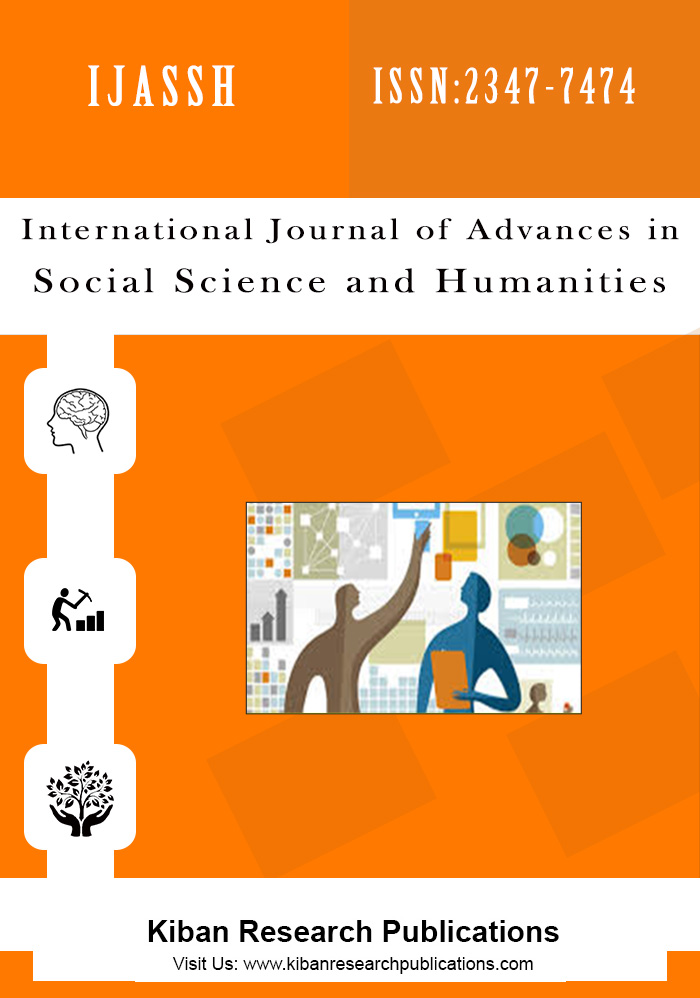Feasibility of Public-Private Partnerships in Tribal Areas of Botswana: Evidence from Mongala Shopping Mall
Abstract
Economic downturn and the resultant financial constraints has for many years  forced various tiers of government around the world (federal, state and local) to look into the advantages derivable from partnering with the private sector in the context of developing its much needed infrastructure. Botswana is not an exception in this drive for new initiatives in infrastructure delivery where her two tiers of government, central and local government are initiating public-private partnership development projects. The objective of this paper was to examine the feasibility of Public-Private Partnership in the Tribal Areas of Botswana. The paper presented a general overview of the concept and practice of Public-Private Partnership from a world-wide perspective and proceeds to examine the theoretical framework relating to the use of Public-Private Partnership in procurement and the selection of appropriate contracts thereof. The survey showed that the project was executed through Build – Own - Operate and Transfer (BOOT) at the end of the sub-lease contract which was done through open bidding criterion. The shopping mall is to be transferred to the district council after it has been operated by Time Projects for a sub-lease period of 45 years. The implementation of the project was devoid of cost and time overruns. It was concluded that the Public-Private Partnership arrangement was a successful way of transferring both project financial and quality risks to the private sector. The construction of this mall will thus leave a long standing footprint in Kanye in terms of the socio-economic development of the area
Keywords: Feasibility, Public-Private Partnerships, Mongala Shopping Mall, tribal areas, Botswana.
References
Ahadzi M, Bowles G (2004) Public–private partnerships and contract negotiations: an empirical study, Construction Management and Economics, 22:9,967-978, accessed February 25, 2016 from, http://dx.doi.org/10.1080/0144619042000241471
Tennyson R (2003) the Partnering Toolbook. London: International Business Leaders Forum. accessed February 25, 2016 from http://www.iblf.org/docs/Partnering Toolbook.pdf
Mfunwa METAL (2015) Regional Conference On Building Democratic Developmental States For Economic Transformation In Southern Africa: Public-Private Partnerships For Social and Economic Transformation In Southern Africa: Progress And Emerging Issues. 20 –22 July 2015, Pretoria, South Africa, accessed March 21,2016 from http://www.developmentalstatesconference.com/wp-content/uploads/2015/07/28-Zebulun-Kreiter.pdf
Akintoye A, Kyaw T, Ngowi A, Bowen PA (2006) Development in public private partnerships for construction-based projects in the developing countries. CIB W107 Construction in Developing Countries Internation Symposium "Construction in developing economies: New issues and Challenges". 18-20 January 2006, Santiago, Chile. Retrieved June 28, 2017, from https://www.irbnet.de/daten/iconda/CIB1914.pdf
Forrer J, Kee JE (2004) Public Servants as Contract Managers?.Public Contract Law Journal,361-367, accessed on March 3rd, 2016 from http://www.jstor.org/stable/25755274
Reeves E (2008) The Practice Of Contracting In Public Private Partnerships: Transaction Costs And Relational Contracting In The Irish Schools Sector. Public Administration, 86(4):969-986. Accessed on March 7th, 2016 from http://onlinelibrary.wiley.com/doi/10.1111/j.1467-9299.2008.00743.x/pdf
Sharma KC (2008) Privatization and Public Private Partnership In Africa The Case Of Botswana. Globalization, Governance, and Technology: Challenges and Alternatives.232. Accessed March 4th, 2016 from http://www.paperroom.ipsa.org/papers/paper_5363.pdf
Republic of Botswana (2000) Privatization Policy for Botswana, Government Paper No. 1 of 2000, Ministry of Finance and Development planning, Government Printer.
Republic of Botswana (2009) Public-Private Partnerships Policy and Implementation Framework, Ministry of Finance and Development Planning, Gaborone.
Rao NT, Vokolkova V (2003) Public private partnership in road transport sector in Botswana. In Botswana. accessed on March 7th, 2016 from https://dev.codatu.org/wp-content/uploads/Public-private-partnership-in-road-transport-sector-in-Bostwana-N.T.-Rao-V.-Vokolkova.pdf
Jefferies MC, Mc George, Chen DSE, Cadman K (2006) Sustainable Procurement: A contemporary View on Australian Public Private Partnerships (PPPs) Conference on Construction Culture, Innovation & Management, Dubai, 26-29 Nov., accessed February 20, 2016 from https://www.irbnet.de/daten/iconda/CIB4428.pdf
Adeyemi AY, Samman J, Mselle PC (2015) Traditional procurement system as a source of unsustainable development: empirical evidence from public infrastructure projects delivery in Botswana. Proceedings of the International Conference on Infrastructure Development and Investment Strategies for Africa (DII-2015), 16th -18th September, Livingstone, Zambia, 430-437.
Tomova A and Palicka L (2008) Slovak Transport Infrastructure In The PPPs World, 5th International Scientific Conference: Business and Management, Vilnius, Lithuania, 16-17 May, accessed February 27, 2016) from http://www.leidykla.vgtu.lt/conferences/bus-and-mana_2008/inf-communication/747-750-6-art-tomova-palicka.pdf
Williams I, Falch M (2014) PPPs and future broadband infrastructure development, March 10, 2016 from http://www.commonwealthofnations.org/wp-content/uploads/.../gag14-front.pdf
Duffield CF (2005) PPPs in Australia: Public Private Partnerships – Opportunities and Challenges’, Conf. Proceedings, 22 Feb., CICID, the University of Hong Kong, 5-14. accessed on March 3, 2016 from http://www.civil.hku.hk/cicid/32/papers/2.pdf (03-03-2016)
Khanom NA (2010) Conceptual Issues in Defining Public Private Partnerships (PPPs), International Review of Business Research Papers, 6(2):150-163 accessed March 3, 2016 fromhttps://www.researchgate.net/profile/Nilufa_Khanom/publication/228862464_Conceptual_Issues_in_Defining_Public_Private_Partnerships_%28PPPs%29/links/55115a3b0cf21209d5285b28.pdf.
Mannathoko I (2012) BOCCIM Business Conference: Public-Private Partnerships, Presented 14-17 October, accessed on March 7th, 2016 from http://www.boccim.co.bw/res-doc-download.php?doc_id=10
Farlam P (2005) “Working Together: Assessing Public-Private Partnerships in Africaâ€, NEPAD Policy Focus Report No. 2, South African Institute of International Affairs Accessed on March 5 , 2016 from http://www.oecd.org/investmentfordevelopment/34867724.pdf
Grimsey D, Lewis MK (2005) December. Are Public Private Partnerships value for money?: Evaluating alternative approaches and comparing academic and practitioner views. In Accounting forum 29(4):345-378 Elsevier.
Zhang X (2005) "Criteria for Selecting the Private-Sector Partner in Public–Private Partnerships." J. Constr. Eng. Manage., 10.1061/(ASCE)0733-9364(2005)131:6(631), 631-64, accessed March 18, 2016 from http://ascelibrary.org/doi/abs/
Cruz CO, Marques RC (2013) Flexible contracts to cope with uncertainty in public–private partnerships. International Journal of Project Management, 31(3):473-483.
Jamali D (2004) Success and failure mechanisms of public private partnerships (PPPs) in developing countries: Insights from the Lebanese context. International Journal of Public Sector Management, 17(5):414-430. accessed March 10, 2016 from https://www.researchgate.net/profile/Dima_Jamali/publication/235321108_Success_and_Failure_Mechanisms_of_Public_Private_Partnerships_%28PPPs%29_in_Developing_Countries_Insights_from_Lebanese_Context/links/0f317533a7ca1efc57000000.pdf
Yin RK (2003) Applications of Case Study Research, Sage Publications Inc., London
Njie B, Asimiran SJ (2014) Case Study as a Choice in Qualitative Methodology. Journal of Research & Method in Education, 4(3):35-40 retrieved April, 20th from http://www.iosrjournals.org/iosr-jrme/papers/Vol-4%20Issue-3/Version-1/EO4313540.pdf
Kothari CR (2004) Research Methodology: Methods and Techniques. 2nd Edition. New Delhi: New Age International (P) Ltd., Publishers
Republic of Botswana (2003) National Development Plan 9: 2003/04-2008/09, Ministry of Finance and Development Planning, Gaborone.




